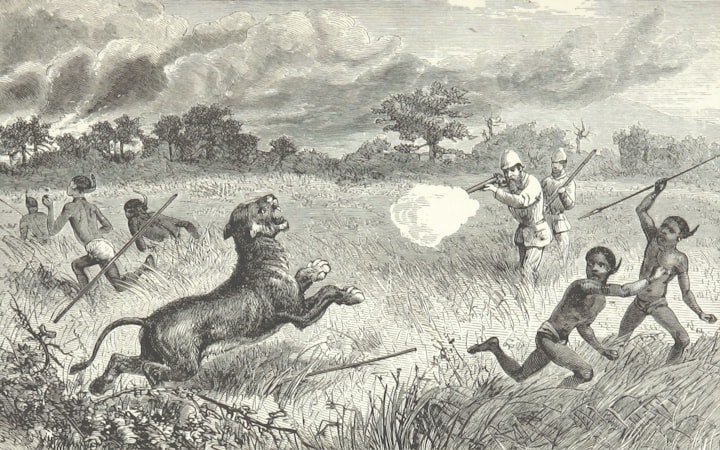I Ran So You Could Fly
Chapter 1; In The Beginning

We weren’t always slaves. We weren’t always living in the provinces. Mama told me that we come from a great land called Africa. We were stolen from there, proper snatched up.
From the way she told it, huge ships came, full of rich white folk and they just took people. Locked them up in cages and put them on boats to make them work in all sorts of places. They’d grab people just walking, ‘specially in the dark, just grab them and take them like wild dogs.
Africa is a huge land way across the ocean, at least as far as I’ve been given to understand. It’s full of all kinds of different people who speak different languages and have different ways of living. They even got kings and queens over there. Can you imagine that? A land where Black folk, Negroes, they call us here, are kings and queens?
On Saturday nights, Mama used to tell us stories about Africa. Daddy didn’t like it much. He figured it was putting grand ideas into our heads that might get us feeling too big and get us whipped. She didn’t pay him much heed and eventually, he was right there with us, huddled on the dirt floor around the ash. Sometimes, he’d even join in and tell what he knew.
Neither Mama nor Daddy ever been to no Africa. But their parents were born and raised there. They were snatched up.
Mama said her parents were from a place called the Biafra. They were proud, honourable people. Her mother, Aya, was tall and sturdy, with strong arms and legs and a soft spirit. Her father, Kouakou, was shorter, thick, and powerful. He was whip-smart and one of the strongest men in the village. He could hunt anything with just a spear and his own cunning. He was the son of a chief.
Aya was caught first. In the dark of the night, as they walked home from a wedding feast. Kouakou, my grandfather heard her scream. He had been walking ahead of her. He knew what happened and stopped to let them get him too. Not because he wanted to be caught, but because he wasn’t letting her go alone. He figured he’d have a better chance of seeing to her safety if he was with her. Leastways, he’d know where they were taking her.
They were brought to South Carolina and put to work on the LeClair rice plantation. Not for Ol’ Man LeClair as we know him, but for his father, James LeClair, Sr.
The senior LeClair, as word would have it, ran away from France with his family and came to the province.
The LeClairs were French Protestants, Huguenots, they called them. The King at the time made a law saying it was illegal for them to practice their way of honoring the good Lord. There was all sorts of violence directed at them from what I was told. Those who had the means to do so left. And they left in a good hurry, as you can imagine.
The LeClair's had means and then some. They were rich as rich can be! Still are, I expect. They set themselves up pretty good with rice farming.
Rice was a huge crop. Everybody wanted to get into rice back then. Many are still in it. Good money in rice, real good. And the South Carolina low country with the heat and humidity was a perfect place to grow it.
The problem was white folk didn’t know rice farming from row boating. It ain’t easy. It’s hard, hard work. Some of the hardest around. It’s also delicate work in a way. There’s a real science to it. You need a keen sense of the land, the water, and how to manipulate them both.
There’s a lot to be done before you even think of planting. Rice just don’t grow for its own sake. You got to drain swamps, clear trees and brush, and level up the land. Then you have to know how to get the culverts and ditches in to bring that water that you just cleared out back in the way you need it.
There’s mosquitoes everywhere giving folk all manner of deadly fevers. White folk can’t handle them bugs. Kills them deader than dead. And quick too!
But Africans been farming rice for centuries and maybe even beyond that. They, well, we, have the skills, the strong bodies, and even a natural defence against them bugs that are so harmful to the white man. I can’t explain it, all I know is it’s true. Could be we’re just used to them bugs so they don’t bother us no more.
I can’t fathom how they figured out that there was a whole body of people a world away like us that could do their work, but someone did, and as Mama told it, the ships just come and that was it. Whole villages were taken, sometimes not even taken, but sold off for rum or gold by their own chiefs, kings, and queens. Now, I can’t say for sure, I wasn’t there, neither was Mama, but her Mama told her and she ain’t been known to bear false witness.
My grandparents on both sides built the LeClair plantation. Not just the fields, but the Big House too, where the master lived and where his kin might well still live. And they kept that rice coming.
Daddy didn’t know much about his people, aside from them being stolen from a place called Congo and he wasn’t entirely certain about that. He said his Mama was sweet and kind and worked in the Big House as a cook and maid for Elder LeClair’s wife. She had a quiet, dignified manner, a straight back, and a real warm way about her. His father worked the fields and died when he was 4. They weren’t taken together. They met and married right on the plantation. His Mama died when he was 9 or 10.
Mama and Daddy met on the plantation too, as children. By that time, the old man was dead and his son, James Jr. done took over. I refer to him as Master James. Mama said she has no real recollection of the elder LeClair, he died when she was small.
Mama and Daddy played together when they were really little. Then, a time came when they didn’t see each other much for years, except in passing. Mama was tasked at 7 to watch over the other slave children. She took her responsibility seriously and often had a dozen or more young ones in her charge.
Daddy worked in the fields. he also did some carpentry and coopering. Master James liked Daddy, in as much as a master can like a slave. He was clever. He could learn to do anything with his hands just as long as someone showed him. Sensible is what they called him.
It didn’t keep him out of the fields, but it sure did make him more valuable and sometimes, he got to leave the business of rice farming to go build something.
He was building some sort of outbuilding when he met Mama again as a young man of about 14. She’d been promoted to the Big House and was no longer minding slave children. She was minding white children, the master's children, James, Jonathan, Sissy (her real name was Genvieve) and Thomas. He spoke to her. She was aloof, too busy with the kids to bother with him initially.
But she admitted she liked the look of him. He wasn’t tall, shorter than her, in fact. Mama was near to 6 feet with broad shoulders, a slender waist, and generous hips and legs. Daddy was about 5 foot 8. But he had a powerful build and a likely face.
She particularly liked the fact that he was clever. Mama was a very keen woman. Seemed like she could pick up anything just from being in the vicinity of it.
They began meeting secretly in the dark of night and found they liked each other. And that like turned to love after a time. They married.
It wasn’t legal for slaves to marry, but we’ve always had our ways of doing things. Far as we were concerned, as long as a couple made promises before god and each other, they were wed.
I have to pause here with a thought that long plagued my mind. The old man, LeClair Sr., I never made his acquaintance, but I always wondered about him. Lots of folk praised him like he was such a good man. Said he was fat and jolly most times. Said he treated his slaves in a real benevolent manner.
That’s all fine and good. But here’s what I never been able to get my head ‘round, to this day. This was a man who had to run away from his home. He put his family on a big boat and sailed across open waters to a new land.
This was a man that was chased out by folks that hated him just because he chose to worship in a different way. He and his kin were set upon with violence, cruelty, and all manner of indignities. They were persecuted and prosecuted because they were different. They were declared illegal, not even allowed to exist as people, all on account of they weren’t Catholic.
Yet, they done the same to us., didn’t they? They kept people as property and denied us any rights at all. They treated us as they were treated, not as they wished to be treated. They whipped us and used us as little better than farm animals. Worse, by times.
How does a man that knows the pain of injustice inflict it on another? That’s a question I fear I’ll never have an answer to.
Sorry, I know I got off track there, but it’s what came to my mind, and it has long vexed me. I suspect someday, someone with much more learning than myself will be able to address that question.
Getting back to the story, in 1764, I come along. Mama said I was as pretty a baby as anyone had ever seen! And I know it’s true because the Missus of the Big House, was heard to say the same thing, if you can believe that! I was long with sharp dark eyes and a full head of hair. From what I heard; I held my own head up that first night I was born. They named me Lyon after some place that was over there in France.
Mama got 2 full days off when she bore me. Daddy said she lost a lot of blood and was weak. She laboured with me for almost 2 days before that, and I came out bottom first. Then fever set into her.
We both survived and I was left with an older Negro girl called Marie. She was about 6 and bossy, bordering on mean. She did keep us fed and clean, but not before she took all she wanted to eat for herself. Then, she was gone one day. Her mama was crying, wailing like she’d been gutted like a fish in the yard. The child was sold off, they said. I never saw her again. Can’t say I’m all that sorry.
When I was 4, Mama, Daddy, and myself along with my baby sister, Harriot, were sent away. We were sold or given to the master’s son, Thomas. We didn’t go far; I’m guessing no more than 5 miles down the road to his smaller plantation. It wasn’t a good time in my young life. It wasn’t a good time in any of our lives.
..........
This is the first chapter in my upcoming novel, I Ran So You Could Fly which is a fictional account of my real-life 6th great-grandfather, Paris O'Ree. Paris was held as a slave on a rice plantation, along with his parents and sisters, owned by Col. Elias Horry in or around Santee, SC.
At 15, he ran away to join the British army in the Revolutionary War. As a result of his service, he gained his freedom and passage to Canada. He is listed in the Book of Negroes as, "Paris, 19, stout lad."
I wish I could write a factual account, but records are scant. The best I can do is study history and then imagine what it must have been like, what he must have been like as a child born into slavery, a teenage soldier, and then a young free man in a harsh and cold new land where British promises weren't exactly kept.
Without his bravery, I, in a very real sense would not be here. This novel is to honour his sacrifice because he really did run so I and his other descendants could fly.
About the Creator
Misty Rae
Retired legal eagle, nature love, wife, mother of boys and cats, chef, and trying to learn to play the guitar. I play with paint and words. Living my "middle years" like a teenager and loving every second of it!
Reader insights
Outstanding
Excellent work. Looking forward to reading more!
Top insights
Compelling and original writing
Creative use of language & vocab
Easy to read and follow
Well-structured & engaging content
Excellent storytelling
Original narrative & well developed characters
Expert insights and opinions
Arguments were carefully researched and presented
Eye opening
Niche topic & fresh perspectives
Heartfelt and relatable
The story invoked strong personal emotions
Masterful proofreading
Zero grammar & spelling mistakes
On-point and relevant
Writing reflected the title & theme







Comments (11)
Dear Mrs. Misty - Miss you around the 'hood - You are such a terrific StoryTeller - I'll be standing in line for a book cover autograph at your novel signing. Jay Jay Kantor, Chatsworth, California 'Senior' Vocal Author - Vocal Author Community -
Captivating writing! I can’t wait to read more. This is an amazing start to what is bound to be a prize-winning novel. You should enter one of those competitions where you submit a first chapter ❤️
THIS! IS WHAT IT'S ALL ABOUT! Why WE ARE ALL ON HERE DOING what we do as WRITERS! To ACHIEVE such glorious splendor and Perfection such as this first chapter of your work I've just read! I must confess for me in all the years I've been on Vocal and reading random stories, (outside of my work being as biased as I am of my own talent and skills of course! LOL) I do think THIS IS THE BEST WORK I'VE READ TO DATE YET! Keep up the Good Work, I will be back to your page for more. I already know you will not disappoint me! :-)
Beautiful
Marvelous chapter, story & tribute. You never cease to move & amaze me, Misty. As to the question, how could they do to others what they had to flee others doing to them?--there is no limit to the level of contradiction & hypocrisy we seem willing to endure within ourselves if it serves us well. My father-in-law always used to say that poor white folk in rural areas tended to vote Republican, in spite of the fact that most Republican policies worked against them, because they hoped to become rich white folk some day. I would add that, since Republicans embraced racial prejudice as their other go-to with Nixon's Southern Strategy (1968), it also meant that they could blame minorities for all their problems.
Wow. You've outdone yourself with this one, my friend. Just fantastic storytelling. Good luck.
This is a wonderful beginning to what I see as a great novel. Excellent work, Misty, and please write this book. It is important!!
Beautifully and emotionally crafted. I cannot wait to read what's next and my heart aches with the meaning and history behind this.
This is wonderfully written. I love the voice you've employed for the narration. What a fabulous way to highlight your family's legacy. Looking forward to reading more!
Misty, loving your first chapter. Your historical fiction story is spectacular!! Loved it!!!❤️❤️💕
Wow, I really enjoyed this. I'm really really excited to see more of this story.